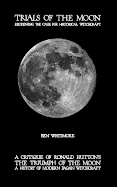 It should go without saying that no one speaks for Wicca. But certain authors have nevertheless attempted to pin the label "duotheist" on Wicca with the explicit intention of creating a clear bright line separating modern Wiccans from the historical Paganism of the ancient world, which reveled in extravagant polytheism.
It should go without saying that no one speaks for Wicca. But certain authors have nevertheless attempted to pin the label "duotheist" on Wicca with the explicit intention of creating a clear bright line separating modern Wiccans from the historical Paganism of the ancient world, which reveled in extravagant polytheism.Question: Do Wiccans recognize (revere, worship, adore, call upon, pray to, honor, sacrifice to, sing hymns of praise to, dedicate works of art to, dedicate their lives to ...) one and only one God and one and only one Goddess?
Answer: Uh, no.
As our first and only witness, let us call Gerald Brousseau Gardner. In Chapter XIII of The Meaning of Witchcraft, Gardner states (on page 170 of the 2004 Weiser edition), regarding ancient forms of Paganism and their relevance to Wicca, that "the only kinds of paganism with which we are concerned here are those which may have had some influence on the witch cult." Gardner then names three such sources of influence in particular: (1) "Druidism, the religion of the Celts", (2) "the religion of the Great Mother Goddess or the old Hunting God", and (3) "the Mystery Cults of the ancient world".
Having cited the Mystery Religions as an important part of Wicca's connection with the ancient Pagan past, Gardner then poses the question, "have we any way of ascertaining what the Mysteries taught?" To which he immediately provides the answer:
At this point, Gardner launches into an extended commentary on the contents of Sallustius' "Pagan Manifesto", with lengthy quotations from several sections of that work. (Gardner uses the English translation of classicist Gilbert Murray, the full text or which is available online in several places, including the blog of yours truly here. The translation was originally published in Murray's Five Stages of Greek Religion.) At the end of this, having given a fairly detailed summation of selected aspects of Sallustian Paganism, Gardner then states:"Fortunately, we have. In the fourth century A.D., when paganism was engaged in a fierce struggle with the new creed of Christianity, Sallustius, who was a close personal friend of the Emperor Julian (called the Apostate because he tried to restore the old religion), wrote a treatise called Peri Theon kai Kosmou, About the Gods and the World. It is probable that this treatise was a kind of manifesto of the highest type of paganism prevailing at that time, and it is evident that its author was an initiate of the Mysteries."
[p. 171]
"Now the thing that will, I think, strike most the consciousness of the reader who is well versed in the teaching of the higher type of spiritualist and occult circles generally is not the antiquity of this teaching of Sallustius, but its startling modernity. It might have been spoken yesterday. Further, it might have been spoken at a witch meeting, at any time, as a general statement of their creed .... [T]he spirit of his teaching, the spirit of the Mysteries of his day, which is also the spirit of the beliefs of the witch cult, is timeless."There can be no doubt whatsoever that Sallustius' "Pagan Manifesto" was thoroughly polytheistic. In fact, the opening words of the manifesto declares that it is addressed to "Those who wish to hear about the Gods." Here is a quote from section VI:
[p. 174]
"Of the Gods some are of the world, Cosmic, and some above the world, Hypercosmic. By the cosmic I mean those who make [ποιοῦντας] the Cosmos. Of the hypercosmic Gods some create [ποῖουςι] Essence, some Mind, and some Soul. Thus they have three orders; all of which may be found in treatises on the subject.
Of the Cosmic Gods some make the world be, others animate it, others harmonize it, consisting as it does of different elements; the fourth class keep it when harmonized.
These are four actions, each of which has a beginning, middle, and end, consequently there must be twelve Gods governing the world.
Those who make the world are Zeus, Poseidon, and Hephaistos; those who animate it are Demeter, Hera, and Artemis; those who harmonize it are Apollo, Aphrodite, and Hermes; those who watch over it are Hestia, Athena, and Ares.
One can see secret suggestions of this in their images. Apollo tunes a lyre; Athena is armed; Aphrodite is naked (because harmony creates beauty, and beauty in things seen is not covered)."
In addition to the twelve Olympians mentioned above, Sallustius also speaks of Asklepios, Dionysos, the Charities, and Kronos, and he also makes frequent references to the Daemons who occupy a place between humans and the Gods. In addition, Sallustius also insists that the Gods must be worshipped properly in the traditional manner. In other words, the Paganism of Sallustius is a seamless continuation of the traditional polytheism of the Greek and Roman civilizations.
But recall that according to Gardner, as quoted above, all of what Sallustius says "might have been spoken yesterday. Further, it might have been spoken at a witch meeting, at any time, as a general statement of their creed .... [T]he spirit of his teaching, the spirit of the Mysteries of his day, which is also the spirit of the beliefs of the witch cult, is timeless."
QED
Suggestions for further reading:
- Thomas Taylor on the Religion of Socrates
- Beauty, Nature, Divinity, Secrets
- Sallustius, Gardner & Wicca: "A general statement of their creed."
- Gerald Gardner, Sallustius, and the Problem of Evil
- Gerald Gardner, Sallustius, and Reincarnation
- "Divested of their garments"
- "On the Nature of the Gods and the Cosmos" (full text)
- Plotinus In Defense of Polytheism
- More on Plotinus on the Gods
- Hinduism, Paganism, & Polytheism



























